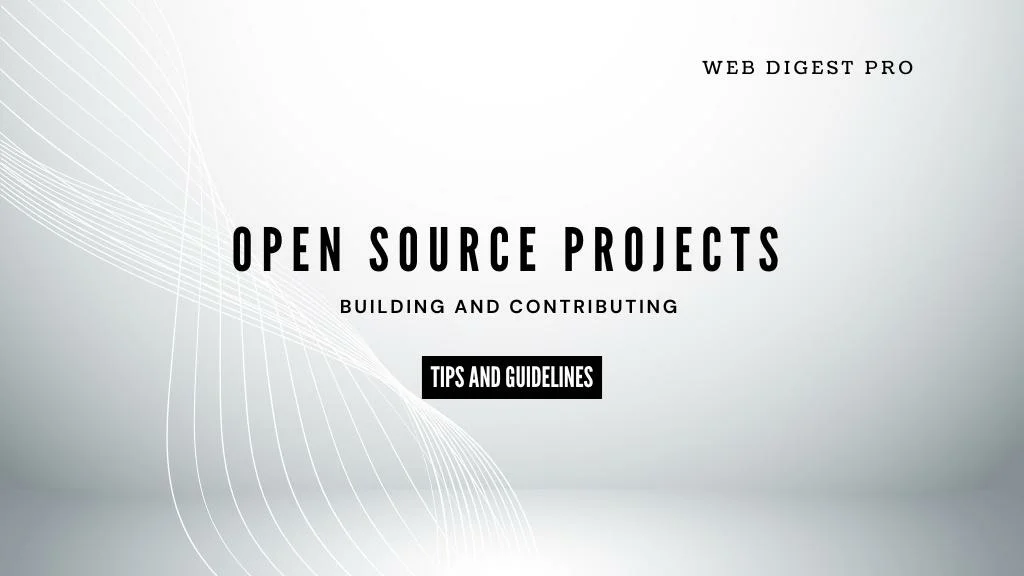The software industry has completely changed with open source projects and collaboration between different teams and communities. Joining open source projects is a valuable way for developers to improve their skills, develop professional connections, and build meaningful software solutions. While indeed the open source landscape is a vast and nuanced one, there are ways to leverage free online resources and tools effectively to maneuver your way through.
Understanding Open Source Projects
1. The Value of Contributing to Open Source Projects
Establishing an open source project has many benefits. It enhances your professional portfolio and helps demonstrate your skills and dedication to potential employers or clients. Additionally, highlighting the valuable networking opportunities is important. This involvement connects you with developers, consultants, and other unexpected industry experts. Most satisfying is the wide range of open source software tools available to facilitate your goals. Finally, an open source project contributes to global technology.
2. Identifying the Right Open Source Project
Choosing the right open source project is critical to a worthwhile experience. Start by evaluating your personal interests. Working on projects related to your interests, such as website development, artificial intelligence or mobile application will be more interesting. Assess your current skill set and get started with a project using a language and framework you’re familiar with. Search forums like GitHub, GitLab, and Bitbucket to find many open source projects. For those who are just starting to get involved, search for issues tagged as “Number one good” or “suitable for beginners” to find easy tasks.
3. Starting an Open Source Project
To start your open source project, begin by choosing the right license. Each open source project requires a license to define the terms under which it can be shared and edited. General licenses include the MIT License, which is permissive and simple, the GNU General Public License (GPL), which requires derivative works to remain open source, and the Apache License, which contains patent rights provisions. Make sure you include the LICENSE.md file in your repository to specify the selected license.
Once the license is established, set the scope of the project clearly. Describe what your project does and its benefits in a well-structured README.md file. This file should contain an overview of the project, installation and setup instructions, and contribution guidelines.
Creating version control is another important step. Use a platform like GitHub or GitLab to start your own repository. Use a branching strategy to efficiently manage features and fixes, using main or master for stable releases. Make sure your commit messages are clear and meaningful to help ensure a smooth collaboration.
Integrate automation through tools like GitHub Actions or GitLab CI/CD to optimize your projects. Automate test, build, and deploy processes to maintain code quality and improve development workflows.
4. Encouraging Community Contributions
To promote community participation, clear guidelines have to be developed for potential participants. Provide instructions on how to fork and clone a repository. Set coding standards and best practices and create a summary of issue reporting, pull requests, and submission processes. It helps to maintain an active issue board, by classifying issues as bugs, enhancements, or document updates, and publish beginner-friendly tasks to encourage new participants.
GitHub Discussions, GitLab Issues, or dedicated channels on Slack or Discord facilitate community interaction. The active participation in project-related conversations provide constructive feedback to create a positive and collaborative environment.
5. Leveraging Online Resources
Below is a short list of online resources which can support opensource projects:
- Code Review Platforms: GitHub’s code review features or GitLab’s merge request reviews can be used to get feedback on contributions.
- Mentorship Programs: Platforms such as CodeMentor or online communities like Stack Overflow serve to connect you with experienced developers for guidance.
- Coding Challenges: There exist sites like HackerRank or LeetCode to refine your skills and learn new techniques.
- Live Coding Sessions: Live coding events on platforms like YouTube or Twitch help to see real-time problem-solving and development practices.
6. Effective Contribution Strategies
When contributing to existing open source projects, consider starting with bug fixes. Addressing bugs provides a meaningful way to engage with the project. Improving documentation is another valuable contribution; updating or expanding the README.md, adding examples, or clarifying existing content can significantly benefit the project. Additionally, test new code and review pull requests to help maintainers ensure high-quality contributions. Consider to provide constructive feedback and suggest improvements to support the project’s ongoing development.
7. Sustaining and Growing Your Open Source Project
To sustain and grow your open source project, focus on building a robust contributor base. Encourage participation from other developers and welcome new contributors by guiding them through their initial contributions. Regularly release updates and new features to keep the project active and engaging. Use semantic versioning to communicate changes clearly. Promote your project on broader platforms such as Twitter, Reddit, and developer forums to increase visibility and attract more contributors.
Conclusion
A valuable side benefit of open source projects is that they significantly enhance your development skills and offer numerous professional advantages. Whether you’re initiating a new project or adding on an existing one, online tools can deliver useful insights that enhance your efforts. By engaging with the open source community, you actively influence the direction of software development.
Finally, consider incorporating video tutorials to guide users through setting up repositories, creating pull requests, and using version control effectively. Highlight notable open source projects on platforms like GitHub or GitLab to inspire others. Host interactive sessions such as webinars or live coding events to offer hands-on learning opportunities.
Subscribe to our newsletter!














+ There are no comments
Add yours